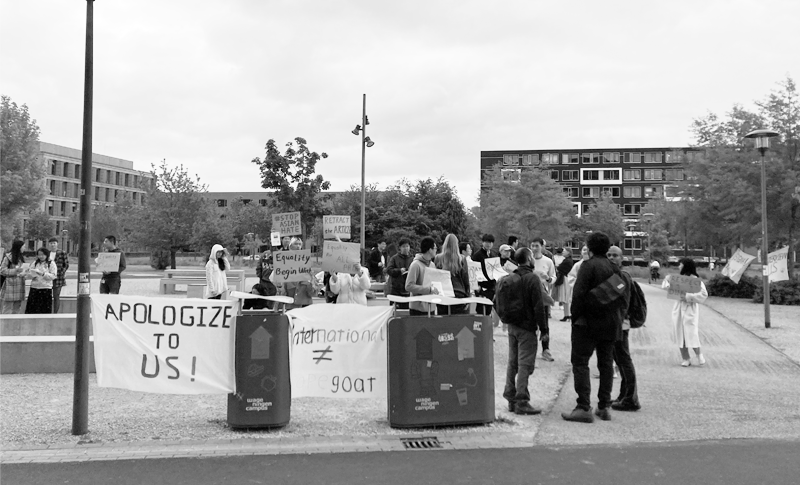The Resource article We need to talk about China prompted a lot of criticism, especially from the WUR Chinese community. Resource spoke to three Chinese PhD candidates about the article and the reactions.
In the article (Resource #16), the graduate schools express concerns about the collaboration with China. The article caused widespread anger and led to demonstrations and a petition demanding an apology from the editors. That demand is preventing a rapprochement. However, three Chinese PhD candidates were prepared to be interviewed. Two approached the editorial board spontaneously and a third accepted our invitation.
Business model
They talked to us on condition of anonymity. Li, Zhou and Zhang (not their real names) say they cannot allow their identities to be known. ‘You don’t know what words will be seen as offensive by the Chinese authorities,’ explains Li. ‘The regime has become a lot stricter in recent years.’ Even so, he wants to let his voice be heard. ‘I have read a lot of comments about the article and most were very negative. I want to make it clear that not all Chinese PhD candidates have this attitude. I too think the article is one-sided and lacks information from the Chinese PhD students themselves, but that doesn’t mean the article is wrong.’
Zhou is even pleased in some sense that the article was published, he says. ‘It addresses important issues. But the article links too many topics together. The structure isn’t good and as a result it creates the impression that Chinese PhD students are a nuisance and only cause problems.’
As a group, we Chinese are turned into scapegoats. That’s how we see the article
Zhang agrees. ‘The real subject of the article, as I now understand from you, is WUR’s business model, which exploits scholarship PhD students. But then the article goes off on a tangent and people are quoted saying negative things about Chinese PhD students, for example that we don’t have any social or academic freedom. But there are no quotes from the PhD candidates themselves. That makes the article one-sided. Also, the quotes that are used are discriminatory. It is insulting and unfair to say I’m misusing Dutch tax money to pay for my education. As a group, we Chinese are turned into scapegoats. That’s how I see the article.’
Racist
‘The article only mentions Chinese PhD candidates, not candidates from other countries,’ says Li to explain the criticism. ‘The Chinese community wonders why that is. What is behind it? That is why the article is being called racist. I read in WeChat (the Chinese WhatsApp, ed.) that some people think the Resource editors are being made to write this. Some Chinese people don’t understand the concept of a free press here. In China, the media is influenced by the people in charge and you can’t just publish whatever you want.’
‘Resource belongs to WUR, doesn’t it?’ adds Zhang. ‘WUR tries to project an image of an inclusive and international organization. This article doesn’t help that image. It feels as if there’s an institutional bias against the Chinese. If the organization thinks an article with the title “We need to talk about China” is acceptable, then there’s something wrong with the organization.’
Whether you encounter a lack of academic freedom depends on your field
According to Zhou, much of the resistance to the article can be explained by Chinese culture. ‘China is not a democracy like you have in the West. Nationalism is the central ideology of the Chinese Communist Party. China, the Chinese government and the Chinese people are ideologically intertwined and inseparable. This nationalism is an essential part of your upbringing in China, from primary school to university. Ideology is a powerful weapon. If someone says something negative about China, all Chinese people feel they have been attacked. That is not a coordinated response; it’s a reflex because that is how you grew up.’
Culture shock
‘Before I came to Wageningen, I didn’t know what the world was like outside China,’ says Li. ‘To be honest, we were indoctrinated in China. That starts at primary school. The Chinese Communist Party is fantastic, China is fantastic and the rest of the world is dangerous and bad. We are influenced to protect our country, our government and the leader of the CCP. Coming to Wageningen was a culture shock for me and it has helped me to understand the world outside China.’ Li says his view of the world has changed, but he finds it difficult to talk to Chinese friends about this. ‘They see it differently and their view of China and the world is fixed.’ When asked whether that is a lack of freedom, Li answers cautiously: ‘Everyone is different; they have their own standards and values, which are fixed. It’s not for me to judge them and say whether that’s good or bad. They don’t think they are not free to think what they want. I feel that is what is behind the conflict with Resource. It’s difficult.’
A lot of the criticism from the Chinese community concerns what the article says about the lack of academic freedom for Chinese PhD candidates. That lack of freedom definitely exists, says Zhou. ‘But whether you encounter it depends a lot on your field. The article isn’t specific enough. That lack of academic freedom isn’t an issue in the natural sciences, but it plays a role if you study social problems and question the policy of the Chinese authorities, especially if your conclusions are negative. I recently showed a Chinese friend a paper I had written. His response was: “Are you really going to publish that?” I am — my supervisor takes a really strict line on that. But it could indeed harm my academic career in China.’
If someone says something negative about China, all Chinese people feel they have been attacked
Zhou is cautious in the use of WeChat too. ‘You need apps like WeChat to keep in touch with family and friends back home. But the apps are monitored by the Chinese government, so it’s better not to talk about sensitive topics. That also applies to files you store in the free cloud of the Chinese search engine Baidu. Baidu scans the files automatically. If they contain sensitive things, you are not allowed to use them. These are things I have experienced.’
Despite his criticisms, Zhou is pleased the article has raised issues such as the underpaid scholarship PhD students and how this is linked to WUR’s business model. He sees the academic business model — and therefore WUR’s too —as a so-called Ponzi (pyramid, RK) scheme. ‘The normal market mechanism is based on supply and demand, on costs and benefits. Society makes money available for research that is meaningful. You can then appoint PhD candidates for that research. But that money isn’t available for a lot of research, so cheap labour is recruited in the form of scholarship PhD students. After they get their PhD and are appointed to an academic position, they in turn recruit more scholarship PhD students. That’s a pyramid scheme. And it is institutionalized in the Tenure Track system. If you want to get promoted, you need to supervise a lot of PhD students. I recently read a WUR job ad for an assistant professor where one of the requirements was that you should be able to attract PhD candidates. That says it all.’
Salary
Li is less concerned by the fact that scholarship PhD students are underpaid. ‘I accept that I earn a lot less than my colleagues who are WUR employees. I don’t find it unfair either. After all, I signed up for it. For Chinese students, a scholarship from the China Scholarship Council is a good opportunity to experience the world beyond China. Internet in China is blocked, which means outside information is limited.’
‘When converted into Chinese currency, scholarship PhD students don’t have a particularly low salary at all,’ says Zhang. ‘If it isn’t enough to live on despite this, the university should help out. After all, WUR gets a lot in return with our papers and our research. We don’t deserve to be viewed so negatively.’
It feels as if there’s an institutional bias against the Chinese
‘I really wanted to go abroad,’ says Li. ‘I worked hard to get my scholarship. The Chinese government pays me. They don’t pay the bench fee though. My chair group pays it, and receives a bonus from the Dutch government after I get my PhD. So we both benefit. Is that wrong? I appreciate the fact that the article raises this issue but I would think it a real shame if this were to disrupt the collaboration between WUR and China. For scholarship PhD students, the collaboration is a good opportunity to see the world outside China.’
Comment
The article ‘We need to talk about China’ (Resource #16) sparked off a barrage of complaints. It led to two demonstrations and a petition that was signed 773 times. The petition demands an apology and the retraction of the article. Until these demands are met, the demonstrators do not see any point in talking to Resource.
Of course we cannot fail to be affected by the anger and sorrow. But from a journalistic perspective, the editors see no reason to apologize for the publication of the story or to retract the article.
The article was based on reliable sources, and no factual inaccuracies have been demonstrated. That many people were unhappy with the content and tone of the article cannot and must not be a reason for the editors to back down. The issues raised in the article are too important for that. But unfortunately, they have been lost sight of in all the commotion. There is still no discussion about the substance. Perhaps that is because of the commotion, which is putting people off commenting (at least in public). That may be why the Wageningen Graduate Schools (WGS) — which produced the internal evaluation the story is based on — have yet to respond six weeks after the publication of the article.* The rector too has yet to say anything about the WGS evaluation, although he was prepared to criticize the tone of the Resource article (‘one-sided, generalizing and discriminatory’) and its impact on the Chinese community.
We will be talking to the Editorial Council, to which two formal complaints have been made. To be continued, in other words.
*The WGS published an article on the intranet just after Resource was published. You can find it here.
The Resource editors

 Demonstration in response to the article in Resource. Photo Resource
Demonstration in response to the article in Resource. Photo Resource 


No ‘factual inaccuracies’ in the article that led to the petition. So, the Resource editors truly do believe that ‘80 per cent of the Chinese PhDs do not pay a bench fee’. And that all ‘Chinese PhD students have to report on each other and those they interact with’? Really? I also understand from the Comment that those who were ‘unhappy with the content and tone of the article’ are the ones to blame for the fact that ‘there is still no discussion about the substance’. You are fully right, your article about this important issue was not full of stigmatizing or discriminatory remarks towards a specific WUR community. We are to blame for the biased discussion, not you.
“I recently read a WUR job ad for an assistant professor where one of the requirements was that you should be able to attract PhD candidates. That says it all”
Are we suggesting that professors should not attract PhD Candidates? There are legal and proper ways to attract students and how is that ever a problem? Good research attract students, and good professors should be able to do that!. Not all pyramid-shaped organizations are Ponzi. Otherwize you can pretty much call everything Ponzi.
Do you know the story of Richard Jewell?
Richard Jewell was an American security guard and later became a law enforcement officer. He was also the first person to discover the bomb and together with other security guards dispersed the crowd on July 27 during the 1996 Atlanta Olympics. He was hailed as a hero initially, but after 4 days, his life changed dramatically when he became one primary suspect in the bombing. The media frenzy that followed was relentless, labeling him as “lone bomber seeking to gain attention” in public, basing their information on a leaked FBI profile. Regardless of his eventual exoneration, his life and reputation were ruined.
Doesn’t this story sound similar to you?
A new round of “Trial by Media” was undertaken. This time, it was undertaken by Resource and targets on Chinese PhDs at WUR, basing his prejudice judgement on Chinese PhDs on rumors, assumptions, quotes of employees who never supervised Chinese PhDs, and the WGS evaluation report, which is not publicly accessible. This media judge knocked down his gavel first time with the article “We need to talk about China”, labeling Chinese PhDs as “cheap”, “lack of academic and social freedom”, and “peer controlling”, ignoring any contribution made by Chinese scholars at this campus.
Resource is a judge at court, not a journalist.
As the only journal with exceptional accessibility at this campus, Resource almost monopolizes the media and it seems that they perceive themselves authorized to judge what is fact and what is not.
“they have been lost sight of in all the commotion. There is still no discussion about the substance.”
▶ Resource, who authorizes you to judge our challenge towards your baseless accusation, our demonstration to make Chinese heard, our communication with PhD councils, DARE, ARA, WGS, rectors as commotion?
“It led to two demonstrations and a petition that was signed 773 times.”
▶ Resource, who authorizes you to describe the 773 individuals who support our petitions as if they were keyboard buttons being pressed?
Is it your prejudice that Chinese people don’t understand the freedom of speech, so you highlighted this in your recent interview and indicated that Chinese people feel there is conspiracy behind the article?
Is it your stereotype that Chinese people are of poor quality and cheap, so you don’t even bother to verify the details and wording of the article yourself?
Is it your arrogance that you judge baselessly that we manipulated the number of signatures we received for the petition?
Is it your ignorance that you underestimate the number of people who acknowledge your mistakes and stand together with us to fight against polarization?
Is it your inhumanity that you don’t care the damage made by this article on the reputation of Chinese scholars and their broken hearts?
You stated in your response: “The issues raised in the article are too important for that.” but let me remind you what you also wrote in the original article: “China is the elephant in the room. I wonder how long Wageningen is going to carry on hosting a large group of students and PhD candidates who lack academic and social freedom.”
This is known as ”司马昭之心” in Chinese. It s not what but who that Resource want to solve. In my view, the issue of academic freedom concerns a systematic issue of research independence, which widely exist at any countries. So does national identity.
Dear chef-of-editor of Resource Willem Andrée, do you still remember when you showed up during our demostration in front of Axis, that you acknowledged you could not verify every detail such as the estimated 80% bench fees and acknowledged that some information was based on rumors and assumption? We were open to each other and communicated to understand back then, but this became “The article was based on reliable sources, and no factual inaccuracies have been demonstrated.” in your recent remark.
Do I expect any further dialogue with Resource? No, and I am desperate.
I have spent almost 6 years, 1/5 of my life in this country. I was a MSc student that could not convey my thoughts 100% in English. I was a healthcare QA specialist, fighting against the pandemic together with my colleagues from more than 5 different countries. I met so many great people and friends who never treated me differently. This never changes after I returned to WUR a second time as a PhD. But I feel desperate. I am deeply concerned if I may be one of the ones who were lucky and got accepted because I know that a Chinese’s window was smashed during the pandemic; I see an owner of a Chinese restaurant was harassed by phone calls a few month ago; I also remember the humiliating incident that took place in the elevator of Bornsesteeg in 2020.
The last thing I want to see is that Resource’s article will be a fuse for a modern Moral Witch-Hunt on Chinese scholars, planting the seeds of discrimination and prejudice in the heart of those who never get in touch with a Chinese people.
AGREE!!!!!
Just wanted to let readers know that that the voices of Chinese PhDs who initiated the petition letter and organized the demonstrations are not represented in this piece, nor were they included in the interviews.
Why were they excluded? The Editor-in-Chief declined to meet with them to listen to their concerns and reasons when they expressed their hesitation to rush into accepting Resource’s interview within a three-day deadline for this edition’s production. Instead, he insisted that his team would “try to find a way to do a follow-up story in another way.” This piece seems to serve as that “another way” to defend the editorial team and repair Resource’s reputation. It is misleading by, e.g., using the subheading “Chinese PhD candidates have their say in response to an article previously published in Resource,” creating the untrue impression that Chinese PhDs’ views and opinions are well represented in this piece and they are happy with this solution provided by Resource.
Has the editorial team thoroughly read and considered the petition letter (https://forms.gle/PbKSiorVbtKBvUju7), which was signed by 773 individuals, the documented responses from some Chinese PhD students (https://forms.gle/CpVvNZhrHQnfjWhh9), and the critiques from organizations such as the Anti-Racism Association (ARA) Wageningen, the Dutch Anti-Asian-Racism NGO, Asian Raisins, another WUR journalism outlet, The Jester (article “We need to talk about Resource” in Edition 14), as well as the perspectives shared by numerous members of the WUR community?
“The opposite of love is not hate, but indifference.” That indifference is often rooted in prejudice and arrogance, in the belief that some people, such as Chinese, are inferior, and in an authoritarian approach that rarely listens to others.
It took a whole day for Resource to review and approve my original comments above before they were shown here. If I had not reached out by email to inquire about the restriction on my commenting rights, I am uncertain how long it would have taken for my comments to be publicly visible.
I have never engaged in any disrespectful comments before. I would appreciate an explanation of which rule my comments above violated in terms of “freedom of speech” that the editorial team has been proud of.
Resource, as a self-proclaimed “critical” journalism outlet, it is important for you to be able to accept and consume critical comments, even if they are not to your liking. I believe you are also aware that restricting people’s rights or freedom to comment, through whatever mechanism, is not the appropriate way to address problems.
I hope we are listening to each other.
Just wanted to let readers know that the voices of Chinese PhDs who initiated the petition letter and organized the demonstrations are not represented in this piece, nor were they included in the interviews.
Why were they excluded? The Editor-in-Chief declined to meet with them to listen to their concerns and reasons when they expressed their hesitation to rush into accepting Resource’s interview within a three-day deadline for this edition’s production. Instead, he insisted that his team would “try to find a way to do a follow-up story in another way.” This piece seems to serve as that “another way” to defend the editorial team and repair Resource’s reputation. It is misleading by, e.g., using the subheading “Chinese PhD candidates have their say in response to an article previously published in Resource,” creating the untrue impression that Chinese PhDs’ views and opinions are well represented in this piece and they are happy with this solution provided by Resource.
Has the editorial team thoroughly read and considered the petition letter (https://forms.gle/PbKSiorVbtKBvUju7), which was signed by 773 individuals, the documented responses from some Chinese PhD students (https://forms.gle/CpVvNZhrHQnfjWhh9), and the critiques from organizations such as the Anti-Racism Association (ARA) Wageningen, the Dutch Anti-Asian-Racism NGO, Asian Raisins, another WUR journalism outlet, The Jester (article “We need to talk about Resource” in Edition 14), as well as the perspectives shared by numerous members of the WUR community?
“The opposite of love is not hate, but indifference.” That indifference is often rooted in prejudice and arrogance, in the belief that some people, such as Chinese, are inferior, and in an authoritarian approach that rarely listens to others.
I’m so disappointed with Resource that I don’t want to waste another word.
Welcome to read this article from Jester.
https://forms.gle/MUpJnuDQrjaZPpgA8